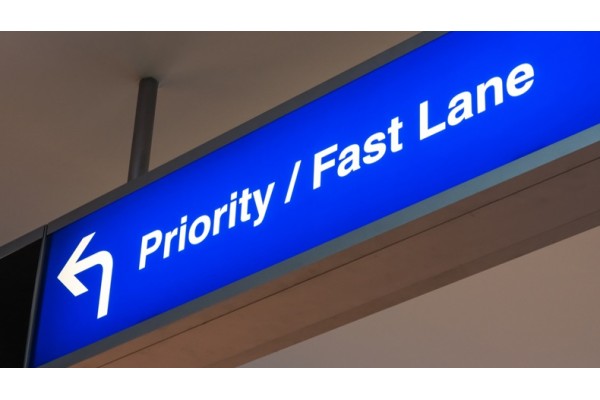AZ’s Farxiga Gets FDA Priority Review For Heart Failure
January 8, 2020
Source: https://scrip.pharmaintelligence.informa.com/SC141424/AZs-Farxiga-Gets-FDA-Priority-Review-For-Heart-Failure
 2,112
2,112
 Source: Shutterstock
Source: Shutterstock
Having ended 2019 with two new approvals from the US Food and Drug Administration, AstraZeneca PLC is getting a speedy evaluation by the agency for a label expansion on Farxiga which will boost its leadership over other SGLT2 inhibitor diabetes drugs in the treatment of heart failure (HF).
The FDA has granted a priority review for Farxiga (dapagliflozin) to reduce the risk of cardiovascular death or the worsening of HF in adults with reduced ejection fraction (HFrEF) with and without type 2 diabetes. The Prescription Drug User Fee Act date for the supplementary new drug application is scheduled for the second quarter of 2020.
The sNDA was based on results from the landmark Phase III DAPA-HF trial presented at the European Society of Cardiology Congress in Paris, France, in September 2019. They showed that the drug reduced the composite endpoint of cardiovascular death or worsening HF by 26% when given on top of standard of care and the benefits were seen in both diabetic and non-diabetic patients.
The FDA appears to like the look of the cardiovascular data that AstraZeneca has been generating from Farxiga of late. A fortnight after the DAPA-HF results were presented at the ESC, the agency granted fast track designation for Farxiga in HF and in October it approved the drug to reduce the risk of hospitalization for HF in patients with type 2 diabetes and established cardiovascular disease or multiple risk factors, based on results from the DECLARE-TIMI 58 cardiovascular outcomes trial.
At the American Heart Association meeting in Philadelphia in November, AstraZeneca presented additional analyses of DAPA-HF which revealed that Farxiga cut the risk of cardiovascular events by 27% compared with placebo in patients without diabetes, while the risk reduction for those with the disease was 25%. Farxiga cut the risk of cardiovascular death by 21% in patients with diabetes and by 15% in those without, with patients with and without diabetes seeing a 23% and 38% cut to the risk of HF incidents, respectively.
An approval in HFrEF would represent a significant market opportunity for Farxiga, which has become a growth driver at AstraZeneca. Third-quarter 2019 sales reached $398m, up 12% on the like, year-earlier period.
Mene Pangalos, head of biopharmaceuticals R&D, said that if approved, Farxiga would be the first medicine of its kind indicated to treat patients with HF, which affects 64 million people worldwide, at least half of which have a reduced ejection fraction. AstraZeneca noted that HF remains as fatal as some of the most common cancers in both men (prostate and bladder) and women (breast) and is the leading cause of hospitalization for those over the age of 65.
If all goes well with the FDA review, the drug will have a considerable lead over rival SGLT2 inhibitors, Eli Lilly & Co./Boehringer Ingelheim International GmbH's Jardiance (empagliflozin) and Johnson & Johnson’s Invokana (canagliflozin) for the indication.
Before the bells rang to herald the end of 2019, AstraZeneca bagged two key approvals from the FDA. The first was a widely expected green light for the PARP inhibitor Lynparza (olaparib) in a new indication, namely the first-line maintenance treatment of BRCA-mutated metastatic pancreatic cancer, while the second one, earlier than expected given it had a PDUFA date of April 2020, was for Enhertu (trastuzumab deruxtecan,) partnered with Daiichi Sankyo Co. Ltd. for metastatic breast cancer.
Lokelma OK In China
AstraZeneca also announced that Lokelma (sodium zirconium cyclosilicate) has been approved by China's National Medical Products Administration (NMPA) for adults with hyperkalemia.
The approval was based on positive results from the drug's extensive clinical trial program (it is already on the market in the US, Canada and Europe) and a pharmacodynamic study in China which showed that patients receiving Lokelma experienced a significant, rapid and sustained reduction of potassium in the blood. Last year, the NMPA included the therapy on the accelerated approval list of "overseas new drugs in clinical urgent needs for China," AstraZeneca noted.
Pangalos, who has just been awarded a knighthood in the Queen’s New Year Honours List, said, “This approval marks an important milestone for more than two million patients in China who suffer from hyperkalemia. Lokelma will offer the opportunity for patients and physicians to achieve long-term disease control and potentially reduce the risk of acute episodes, which can have serious, even life-threatening consequences.
By 1
Read more on
- Alchemab to collaborate with AstraZeneca on prostate cancer research May 7, 2021
- Fasenra Granted US Orphan Drug Designation for Eosinophilic Oesophagitis October 8, 2019
- Global Recall of CyPass Micro-Stent by Alcon September 3, 2018
- Breakthrough Device Designation Granted to Digital Intervention for Alzheimer’s August 27, 2018
- FDA Approved Eye Drop Oxervate to Treat Neurotrophic Keratitis August 27, 2018
your submission has already been received.
OK
Subscribe
Please enter a valid Email address!
Submit
The most relevant industry news & insight will be sent to you every two weeks.



